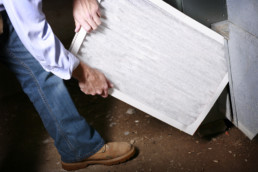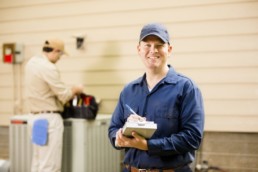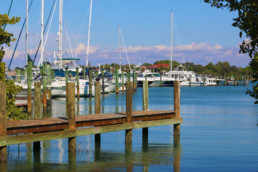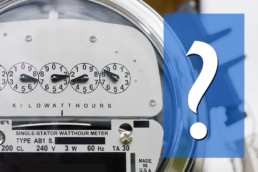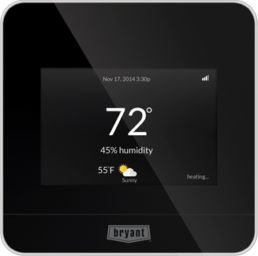Dirty Heater Coils in Your Air Handler are a Fire Hazard
One of the primary causes of heating issues in the home can be linked to dust inside the furnace. In Florida, residents rarely turn on their heating units except on the few cold days of the year. Dust and debris can restrict air flow and cause serious issues with the unit.

You wouldn't think that dust inside the furnace could cause such a serious problem, but the furnace in your home works on the same principle as your vehicle. You'd never go years without servicing your vehicle by maintaining the oil or changing the air filters. A dust-filled furnace won't work properly, but in more severe cases, it's been linked to home and business fires.
The Workings of Your Furnace
To understand the importance of maintaining your furnace, let's learn how the furnace operates. A system that uses forced air is one of the most common types of systems for Florida residents. It uses the same returns for central air, which is what most homes have in the state. A heat exchange warms air before blowing it into the ducts through the unit's fan. A return duct pulls air from the home, circulates the air through the heat exchange and blows it through the ducts. This circulation continues until the home reaches the correct temperature dictated by the thermostat.
How Does Dust and Debris Interrupt That Flow?
When the system sits for most of the year unused, dust and debris can accumulate on the heater coils in your air handler. The first day you turn on the system, the heat is trying to burn off the dust, but that might be difficult depending on the amount of dust on the system. Instead of burning away, the dust has the potential to catch fire. Along with the fire hazard potential, a clogged system may result from all that dust. Much of the dust buildup will clog the air filter. Reduced airflow to the system will cause the heat exchanger to work overtime, which can cause it to overheat. Along with an burned out heat exchange that can cause the system to fail, clogs can cause other serious issues like furnace failure.
Reduced and Unhealthy Air Flow
When the system is dusty and dirty, the air pulled through the filter and into the system can be filled with that debris. After it's heated, the dirty air is sent to the home through ducts that can be filled with dust too. Anyone with allergies or serious respiratory issues will find that the air is dangerous for them to breathe. If there are people without allergies, the air can still be a problem since it's filled with dirt and dust. It's not a healthy situation for anyone. Indoor air quality can be seriously compromised, and the effects can be very negative to your health over time.
What Should I do if I Smell Burning?
After you turn on the system for the first time, if you smell burning, you should immediately shut down the furnace. Make sure that there isn't a fire in the furnace and call emergency services if you see sparks or fire. If there isn't a fire in the unit, you should call a professional HVAC company who is experienced in cleaning and maintenance of furnaces in your area.
The best way to avoid a fire hazard in the first place is to have an HVAC company clean and check your system before you fire it up for the short heating season. The HVAC technician will clean the dirty heater coils as well as replace the filter, which will stop the dust from entering the system at all.
Getting Heat From Your Air Conditioner During Cold Weather
While most people know that central air is great for cooling down a home, most do not realize that this is actually the same unit that provides the heat in a home as well.
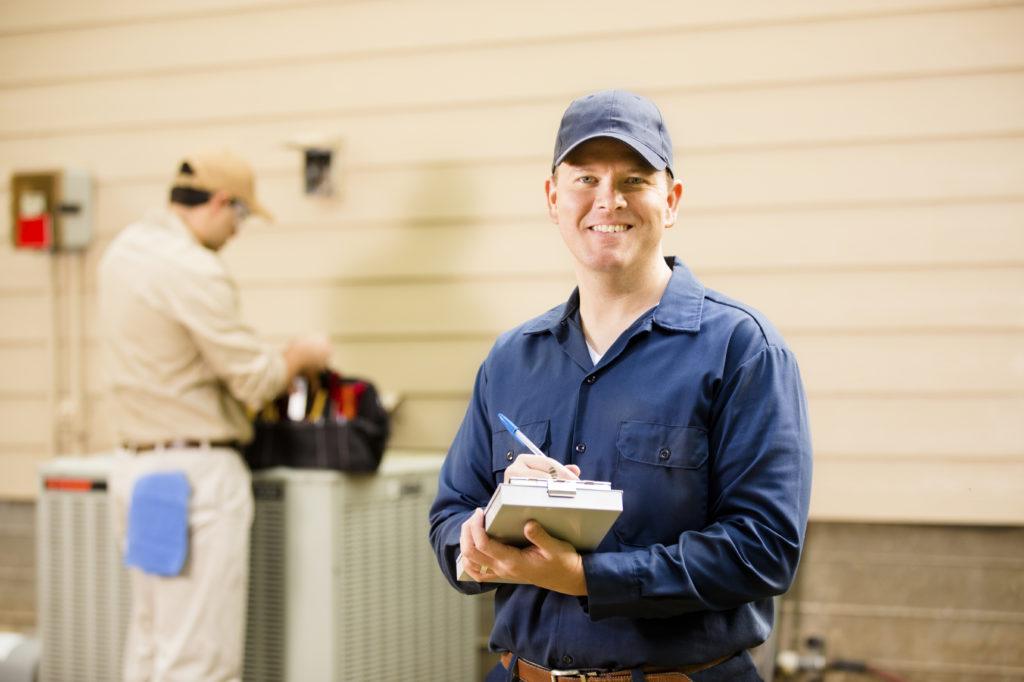
This kind of air conditioner, known as a heating, ventilation, and air conditioning unit, or HVAC unit, controls and regulates the interior air quality and temperature. However, with the winter months and the cold approaching these units are under stress from the severe weather. As such, some of these units may fail without proper servicing. If that is the case then owners may experience loss of heat. That does not mean that the home cannot be heated again, only that a different kind of heating is required.
On most thermostats, there is a red button that, when pressed, will turn on the emergency heating unit. If the primary heating unit fails, this backup will serve to heat the home until the HVAC unit can be serviced. Luckily, all homes that are in northern climates, or areas that dip below thirty five degrees, are required to have secondary heating. Under normal conditions, the HVAC unit will use both the primary heating unit and the secondary heating unit for any additional supplementation. When the primary heating unit fails, the secondary heating unit is engaged when the emergency heating button is pressed in order to replace the primary heating unit. While this is an excellent feature for emergencies, the secondary heating unit is not designed to replace the primary heating unit, and should only be used until the HVAC unit can be repaired.
The heat pump, or primary heating unit, is what heats your home during normal function of the HVAC unit. In the winter months, due to the extreme weather conditions, this unit could become damaged as it is often placed outside of the home. Whenever there is any kind of dangerous weather, it is important to check the unit to make sure that there is no visible damage. Snow, ice, and fallen tree limbs could compromise the unit and cause it to fail. The emergency heating unit will bypass the heat pump if it is damaged and still provide heat to the home. However, by bypassing the heat pump, the unit has to work harder and expend more energy, which, if the heat is electric, could wind up costing the owner a large amount of money. So while emergency heating is efficient for short term use, it should never be used to replace the heat pump entirely.
The best way to avoid any failure on the part of the HVAC unit is proper maintenance and servicing throughout the year. Common problems with air conditioners that are older arise from infrequent servicing. These problems include, refrigerant leaks, electric control failure, sensor problems, and drainage problems.
A refrigerant leak in an HVAC unit will result in the unit not supplying the needed cold air at the same efficient rate. The unit will have to work harder to maintain the cold air, costing you money and adding stress to the system. Furthermore, if the unit runs out of refrigerant, no cold air will come out at all no matter how low the thermostat is set. On top of that, if refrigerant is leaking it could damage the environment. If owners experience these problems, an HVAC technician will be able to diagnose and repair the leak.
If a unit is turned on and off frequently, the compressor or the fans could stop working due to corrosion on the electrical contacts or a connection issue. These contacts and connections should be cleaned and checked by a professional regularly.
Thermostats are designed to properly scan and analyze the room temperature and communicate to the HVAC unit to regulate the system. If the unit is moved or damaged however, it may result in improper analysis and erratic HVAC behavior.
Lastly, in humid environments with a high level of condensation, the condensate drain should be checked and unclogged as necessary to ensure that the unit drains properly.
If the recent cold weather in our area has you discovering problems with your heating system contact the HVAC pros at Mahle Cool Air and Heating.
What Are The Most Likely Issues With Old Air Conditioners?
Your air conditioner is a complex apparatus, consisting of many different parts that can eventually wear out. With proper maintenance, however, an AC unit can last for many years. Older models are subject to such problems as worn-out electrical connections, faulty wiring, inoperable thermostats, or burned out compressor or blower motors. In most cases, these problems are easily corrected when the work is performed by a licensed, experienced heating and air conditioning repair technician.
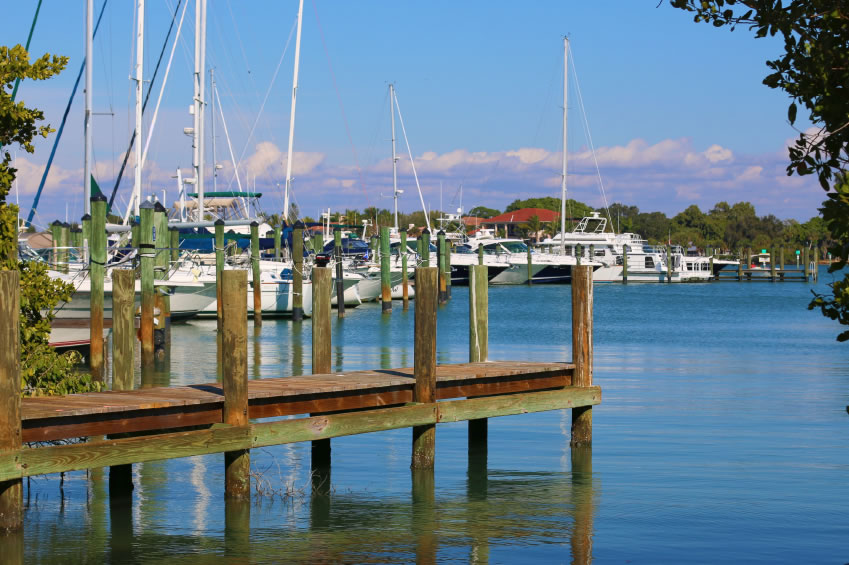
It's important to keep your system in good running order, especially if it is an older unit. Besides the proper maintenance procedures you can complete yourself, it's a good idea to have your system checked at least once every 12-24 months by a repair expert. Replacing the entire unit because of maintenance negligence is far more expensive than most repair operations. Some of the most common issues with older model air conditioners are explained below. These are easily repaired by an HVAC professional.
Loss Of Cooling Power
Your system's refrigerant is what cools the circulated air. If your air conditioner is no longer producing chilled air, your refrigerant may be becoming weakened or you may have a leak in the refrigerant line. When the refrigerant sits idle for long periods of time during non-use, it can become sludged. This can cause a blockage in the smaller feed lines in and around the evaporator coils. If your coolant lines around the evaporator coils are becoming frosted over, it may be the result of blocked refrigerant flow.
A refrigerant leak occurs when an older piping system becomes corroded. A leak usually happens very quickly, with all of the refrigerant escaping within a period of minutes. If your system suddenly fails to produce cool air even when the blowers are working properly, you will likely have to have your system recharged with a new supply of refrigerant.
Clogged Or Worn Evaporator Coils
The evaporator coils come into contact with the air being drawn in by the blower. This is where the heat in the air is transferred to the coolant. Older models are susceptible to evaporator coil problems, especially if the coils become clogged with dust, grit, or other airborne particles and hair.
It's important to clean off both edges of the coil surfaces from time to time. Even when the filters are being replaced regularly, the coils still become coated with grit and grime. However, even when cleaned off on a regular schedule, the coils become coated on the inside. This requires a professional cleaning procedure, one that should be scheduled every one or two years.
Motor And Fan Problems
Most systems have two fans. One is the blower fan that is located beside or above the evaporator coils. This fan can become stuck if the shaft becomes knocked out of alignment or if the shaft is coated in grime. If the motor is whining but the fan is not turning, the motor itself may be wearing out.
The compressor fan is operated by a similar type motor. If the motor buzzes but does not operate the fan, the motor is probably burned out and needs to be replaced. However, the problem may be a worn out capacitor. The motor is connected to a jump-start capacitor that delivers additional amperage to get the motor shaft turning. You may need to call in the services of a professional to determine whether the problem is with the motor or the fan.
Dirty Filters And Air Ducts
The filters located near the evaporator coils should be replaced once every four to six weeks. If they become clogged, less air will transfer its heat to the coils, and the output pressure from the registers will be reduced significantly. In older systems, it is vitally important to have a professional clean out the ducts as well. This reduces blockage and also keeps the duct system free of harmful biological agents.
Faulty Thermostat
If the thermostat is more than 10 years old, it should be checked by a professional each time any other repair service is performed. Sometimes a faulty thermostat reads temperature incorrectly, which can lead to cycling of the system. It is recommended that the thermostat be replaced by a newer model that can more accurately measure actual room temperature. Newer models also have some high-tech features that allow for customizing the amount of work the system performs, which can save a lot of energy.
Get Professional Help
It's best not to attempt any type of repair job unless you have the adequate training and experience required. We are a family-owned HVAC company with decades of combined experience in all types of system-related problems. We are NATE-certified and Bryant Factory authorized, and we promise complete satisfaction with each type of repair or replacement work we perform.
Is a heat pump or central air conditioning system the right fit for your Venice home?
It's a decision that many homeowners in Venice face when its time to replace a malfunctioning or aging heating or air conditioning system:
Should I install a heat pump or central air conditioning system and what exactly is the difference between the two, anyway?
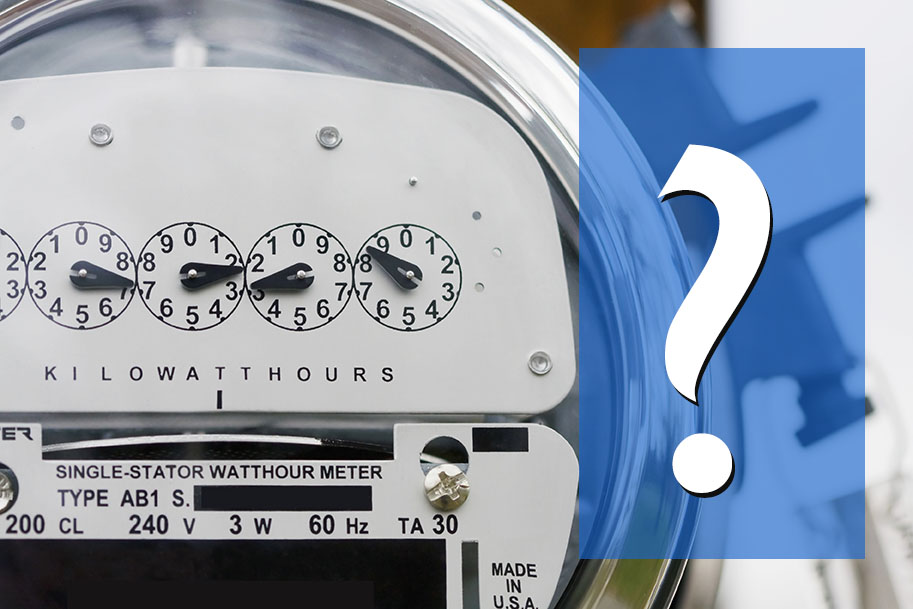
How heat pumps and air conditioners work
First things first. What makes a heat pump a heat pump and an air conditioner an air conditioner? That can be a little complicated. Both use basically the same technology to operate, just in different ways. And that can have a big impact on the comfort level inside your home and in your wallet.
A heat pump relies on a closed loop system that circulates refrigerant so that hot air is blown inside your home during the winter and outside during the summer via what is known as a reversing valve. That means that heat pumps function as a heater during the colder months and as an air conditioner during the warmer months. Since heat pumps function to make your home comfortable all throughout the year, they can also help you keep your energy bills in check. In addition, many heat pumps operate more effectively in temperate climates as we enjoy here. They also use a multi-split ductless system to distribute air throughout your home.
Air conditioners use a closed loop system to circulate refrigerant that cools the air. The refrigerant makes it way through a compressor valve, which puts it under a lot of heat and pressure. The refrigerant then travels through a compressor coil, which siphons off the hot air to outside your home. This process changes the refrigerant into a liquid while it still remains under a great deal of pressure. The liquid is then moved through what is called an expansion valve and from there into a series of evaporator coils. As the liquid evaporates, it works to pull heat from the surrounding air and cools it. That cool air is then blown by a fan through a system of ducts into your home.
Which one is right for you?
By now you may be thinking that there's really not a lot of difference between a heat pump and a central air conditioning system - you're right.
The major differences between the two come into play when you consider how they operate in the winter. And while we who call Venice home may not need to run the heat as much during the colder months as our more northern neighbors do, it can get cold here, so consider the following advantages of heat pumps: Many models do not require additional equipment in order to heat your home, which can free up valuable living space for you, your family and friends. Heat pumps are generally more energy efficient than air conditioning systems, leaving you with more green in your wallet.
And if you are looking to live a more environmentally friendly lifestyle, heat pumps can be partnered with an energy efficient geothermal system such as solar panels and do not burn fossil fuels.
There are also advantages to a central air conditioning system, especially during the winter months. A central air conditioning system will not warm your home as a heat pump will. That means you'll probably use a separate furnace to keep you and your family warm and comfortable when its cold outside. And, furnaces do have several important advantages over heat pumps. They won't shut down when temperatures plummet like many heat pumps will nor do they require auxiliary heating like heat pumps. Furnaces are also generally cheaper to install than heat pumps and have fewer maintenance problems as well. Call or Text us today for more details (941) 203-7955 and don't forget to check out our specials, financing, and rent-to-own air conditioning options. Stay Cool with Mahle!
Are Heat Pumps More Efficient Than Air Conditioners?
Homeowners can rely on energy efficient heat pumps during the summer and the winter months. There are different kinds of heat pumps, but the fundamental concepts for the designs of the units are similar. The units can heat or cool air because there is refrigerant and also a transfer of heat. The flow of the refrigerant can be reversed inside a unit, which will cause the heat to be transferred from a different part of the unit.

Refrigerant
The refrigerant in the unit is used to cool the air that is pushed into a home by the fan on the blower motor. The pipes are insulated to control the transfer of heat as the refrigerant flows through the unit. When there is a transfer of heat, there could also be condensation because the moisture from the air could condense into a liquid. The condensation could form on the outside of the coils as the refrigerant flows through the inside of the coils.
Heat
If the flow of the refrigerant is reversed, then a different part of the unit will generate heat. The refrigerant will flow from the condenser to the evaporator, to the compressor and then back to the condenser. The increase in pressure will cause the temperature of the refrigerant to rise. The pressurized refrigerant is a source of heat. The heat pump is used to transfer the heat from a source of heat to a heat sink such as into a home. The term “heat sink” is used to refer to a destination for the heat.
Convenience
The units are convenient because a homeowner can use a heat pump as a heating system and also as a cooling system. Some homes may have two different systems such as a furnace and an air conditioning unit. An HVAC technician can inspect a home and then recommend some heating and cooling systems. If the local climate has a moderate range of temperatures, then a heat pump may be a suitable choice.
Weather Conditions
Some regions have very cold weather conditions during the winter months. A furnace can be used to effectively control the inside temperature of a home when the outside temperature is very low. In contrast, a heat pump will not be as efficient as a furnace in a very cold climate because a heat pump is only efficient within a limited range of temperatures. A furnace will provide more heat but will also generate larger expenses for monthly utility bills.
Costs
A heat pump is more energy-efficient than a typical furnace because the heat is generated from techniques for compression, which will require less electrical energy than the electrical energy for a furnace. Homeowners could use a heat pump to reduce the costs for monthly utility bills. A primary concern is ambient room temperature. The efficiency of a heat pump will decrease as the outside temperature decreases because the heat pump must generate much more heat in the colder weather conditions.
HVAC Services
Customers can consult with HVAC professionals and discuss specific concerns such as options for controlling the costs for monthly utility bills or different methods for reducing an ambient room temperature. Business managers and homeowners could use the benefits from the improvements to justify the costs for installing a new heating and cooling system. The technicians can offer suggestions for several improvements and also recommend different brands of energy efficient heat pumps.
If you are looking for a new cooling and heating system and have questions about what system is right for your home contact the AC repair experts at Mahle Cool Air today. Call or Text us today for more details (941) 203-7955 and don't forget to check out our specials, financing, and rent-to-own air conditioning options. Stay Cool with Mahle!
Wifi thermostats, Bigger Savings Through Easier AC Management
Wifi thermostats continually increase in popularity, and it’s easy to see why! In today’s connected society, almost everyone has access to the Internet at all times. This connectivity led to an explosion of devices controlled remotely, including the Wifi thermostat. This small investment decreases your energy use at home, making you more environmentally friendly, and in time will pay for itself.
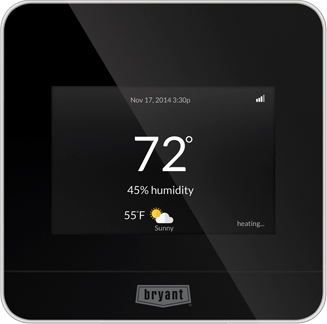
Your Wifi thermostat, or smart thermostats, comes with a state of the art, full-color touchscreen. This attractive screen promotes a user-friendly interface. Some argue that a programmable thermostat provides the same benefits, and they are right to a certain degree. However, most people find programmable thermostats difficult to navigate, never input their schedule, and receive little to no benefit. The user-friendly aspect of wifi thermostats ensures you fully utilize all features.
With its smart setback feature, your wifi thermostat will learn your personal preferences and automatically make adjustments as necessary. The software analyzes patterns in your daily and weekly habits and fine-tunes the temperature accordingly. Before long, it will remember that you stay away later on Wednesdays but come home early on Friday.
Designers realize local weather plays an important part in temperature control and built in a four-day local forecast screen. This display allows you to keep in mind the outside conditions when programming for the day. Perhaps it will be raining, so the house should be warmer when you come in dripping wet.
In addition to making changes via the Internet, wifi thermostats allow for detailed energy use reports. Information is collected from your unit, analyzed, and produced into an easy to read the report. You can use this information to adjust your daily habits to maximize energy efficiency.
Tips to save energy
You will also receive monthly tips on how to increase your energy efficiency based on the data collected. These tips suggest ways to decrease energy use when not at home when to increase the temperature and the optimal time to reset before you come home. Perfect Humidity technology is also included with your wifi thermostat. This technology allows you to maintain optimal cooling conditions based on the relative humidity in your area. Humidity greatly affects how cool your home feels. Seventy-five degrees in zero percent humidity feels much cooler than seventy-five degrees in one-hundred percent humidity!
Several different modes of programming allow you to set up profiles to match your current lifestyle. Use seven-day wide awake programming to actively control the temperature all day. The most commonly used mode, home-sleep, set temperatures for when someone stays at home and when you sleep. Vacation programming enables you to set a return time and temperature.
More control over your temperature
Wifi remote access capabilities allow you to control every aspect of your thermostat from anywhere with an Internet connection. If you remember an appointment after work, you can extend the time you are away from home.
Not only does your wifi thermostat give you complete control, but it also reminds you of important air conditioning and heating maintenance. No more forgetting to change the filter or have the unit serviced. You can also receive alerts for high or low humidity and temperature.
Compatible with humidifiers, dehumidifiers, and ventilators, wifi thermostats can help you control every aspect of the climate in your home with one device. No matter the typical weather where you live, wifi thermostats can lower your energy costs with by regulating several devices.
Hybrid Heat systems can also be managed with your wifi thermostat. This relatively new technology enables you to utilize both gas and electricity to heat your home in the most cost-effective way. Combine with your wifi thermostat to boost savings! Eliminate the need to change between heat and cool with the wifi thermostat, it switches for you! Many cool mornings turn into warm days. If you leave the heat on with traditional thermostats, you may come home to a surprisingly warm house, but not with a wifi thermostat.
Your wifi thermostat also comes with a five-year parts limited warranty with timely registration. Make sure to register your unit to ensure continued functionality. While your system should function properly for years to come, this warranty gives you peace of mind with your investment.
Bottom line
Wifi thermostats greatly increase your energy efficiency and decrease the annual cost to maintain your home climate. They are quickly making traditional and programmable thermostats obsolete and greatly increase the resale value of your home. This small investment pays off not only as you live in the home but if you decide to sell. With exceptional after-sale service, they can’t be beat. Call or Text us today for more details (941) 203-7955 and don't forget to check out our specials, financing, and rent-to-own air conditioning options. Stay Cool with Mahle!
Troubleshooting Air Conditioning Problems: Obstructions Matter
An Issue Some Homeowners Forget
When they encounter problems with a malfunctioning or noisy air conditioning unit, homeowners sometimes forget to check the exterior of the residence. Don't overlook this location! Obstructions around external air conditioning machinery pose problems sometimes.
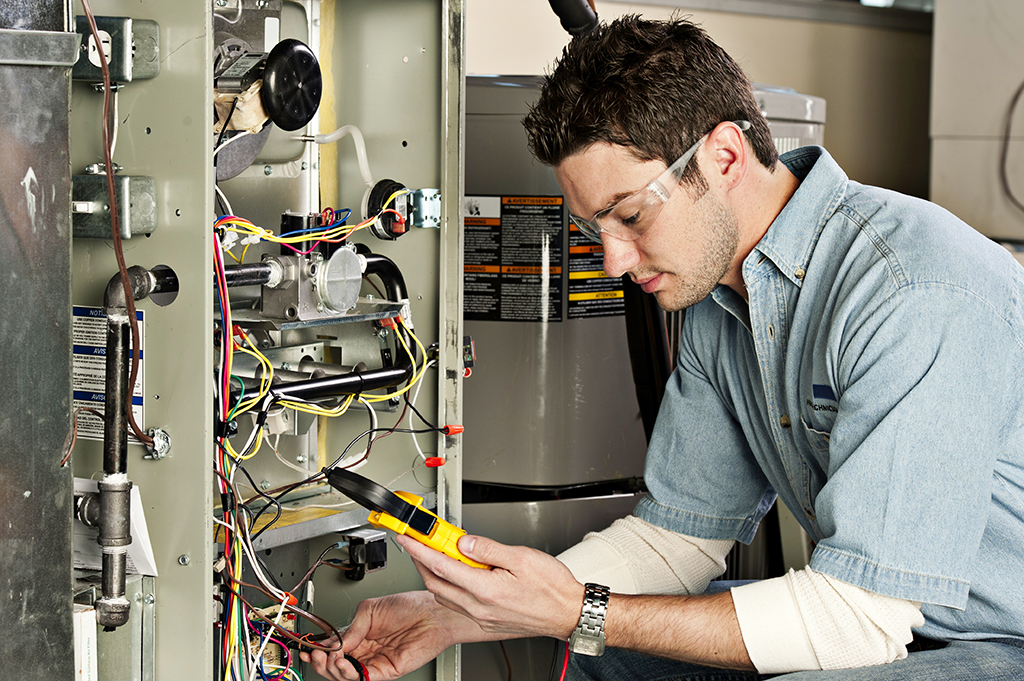
Especially in very warm, sunny, humid climates where gardeners enjoy vigorous plant growth, vegetation may grow rapidly. Florida falls within this category of tropical spots. The wonderful climate in this area promotes robust greenery. Snowbirds, in particular, need to take precautions to prevent air conditioning problems caused by unnoticed obstructions.
For optimum AC unit operation, you should not permit anything to clog or block the exterior of your home air conditioning unit. You'll maintain a much safer premises by taking steps to check this issue periodically.
A Helpful Checklist
One useful step that may assist you in helping to detect problems caused by obstructions proves very simple. Keep a checklist handy. Review these items on a periodic basis:
1. Has sand, cobwebs or debris covered the outside of your air conditioning unit?
2. Do any items of furniture sit too close to the unit to permit safe operation?
3. Has a storm window become an obstruction to a window air conditioner?
4. Have trees, shrubs, grass, climbing vines or other plants begun obstructing the unit?
5. Do household blinds or drapes sometimes blow outside and come into contact with exterior air conditioning equipment?
6. Has trash blown into the area and created an obstruction hazard?
7. Does an exterior fixture, such as a swinging porch or a doghouse, stand too close to the exterior of the unit?
By remaining alert and checking these issues frequently, you'll detect some possible problems before they can cause damage to your air conditioner. The simple step of performing this home maintenance on a regular basis helps promote safer, more efficient cooling. Simply remove obstructions to keep air flows circulating better.
Unavoidable Obstructions
How should a conscientious homeowner handle an unavoidable obstruction? Some older houses in Florida, in particular, may not enjoy efficient window air conditioning units as a result of structural issues. Architects decades ago planned some of these lovely structures without taking highly automated modern home cooling systems into consideration.
One step that might prove helpful in this situation involves reviewing the location of your air conditioning unit carefully. For instance, if your window air conditioning unit or swamp cooler once stood unobstructed, but now sits clogged among mature trees and vines that you would prefer not to remove, re-locating the air conditioner makes sense. The extent of your ability to take this type of corrective action may depend mainly upon the design of the residence.
The Best Sites For Relocated Air Conditioning Units
In a room with a window air conditioner and multiple windows, the issue of finding another site for the unit may not pose a problem. In fact, simply by changing the location of the AC equipment to an unobstructed window, you may enjoy much better air flows inside and outside the home.
Try and find a place for your air conditioning unit that enjoys its own dedicated electrical outlet. Many older units require a lot of electricity. Depending upon the wiring in your residence, you may find that plugging in a vacuum cleaner to a connected outlet will sometimes blow a fuse if the air conditioner operates at the same time.
In the Venice and Sarasota area of South Florida, our company helps residents requiring assistance with these issues. We offer state-of-the-art technology that can provide a solution to this widespread problem. We'll help you discover the best options for cooling your home or office in Florida cost-effectively and efficiently. Call or Text us today for more details (941) 203-7955 and don't forget to check out our specials, financing, and rent-to-own air conditioning options. Stay Cool with Mahle!
Putting Off AC Maintenance Will Cost More In The Long Run
Upgrading your HVAC unit can be a significant expense for your family’s budget. For this reason, you may be putting off purchasing a new HVAC system for as long as possible.
The old adage ‘If it is not broke, do not fix it’ may apply to many situations. However, in the case of HVAC systems, you should replace your old system before it breaks down.
According to the experts at Energy Star, your air conditioner or heat pump unit should be replaced every 10 years. The reason is technological advances make newer HVAC units more efficient than ever. Efficient units can save homeowners hundreds of dollars in utility costs each year.
By using an older HVAC system to heat and cool your home, you are literally blowing your money out of the window. You may be saving money on the purchase price of a new unit, but each month you are spending more money on utility costs. Older HVAC systems are inefficient and wasteful.
HVAC units are only as good as their efficiency as they perform their functions. Each unit is given an efficiency rating by Energy Star known as SEER. For example, units that were installed prior to 2005 have a SEER rating of less than 10.
To put these numbers into perspective, a SEER-9 system that is upgraded to a SEER-13 system can save your family 38 percent in utility costs per year. That is a significant saving.
In 2005, the Department of Energy mandated that all HVAC units have a SEER number that is no less than 13. This legislation by the federal government is an effort to improve energy efficiency in households throughout the United States.
Understanding SEER
SEER stands for Seasonal Energy Efficiency Rating. This is a metric system that was devised to determine the efficiency of an HVAC unit. If a SEER number is high, then it is determined to have a greater level of efficiency. You can purchase an HVAC unit as high as SEER-23.
A simple formula is used to determine the SEER number of an HVAC unit. The calculation that determines the efficiency of your HVAC unit is the number of BTUs divided by the number watts in the system.
The SEER numbers represent the potential efficiency of an HVAC unit. They are not exact measurements that will determine how the HVAC unit will perform in your home.
Factors such as the climate of your geographical area, the size of your home and the quality of your air ducts can determine the actual SEER performance of your unit. At any rate of performance, it will not be less than SEER-13.
Purchasing a New Unit
Before you go to your local ‘big box’ hardware store to purchase a unit with the highest SEER number possible, there are factors that should be considered.
- HVAC units should be purchased according to the size that is right for your home.
- High SEER numbers may not be appropriate for your heating and cooling needs.
- HVAC efficiency can be affected if it is improperly installed.
- Regular maintenance affects your actual SEER number.
Installing Your New HVAC Unit
You might be tempted to install the unit yourself or get it installed by a family friend who performs unlicensed HVAC work. Resist the urge to do so.
Since your HVAC's SEER number and efficiency will be affected by improper installation, you should hire an HVAC company using the following guidelines. All HVAC technicians who install high-efficiency equipment should be certified and experienced.
Experienced HVAC technicians will be able to examine your home and current HVAC system to help you determine a SEER system that is appropriate for your circumstances. If you purchase a system that is not right for your home, you will lose efficiency regardless of the SEER number.
HVAC Efficiency
Although SEER numbers play an important role in your HVAC system's efficiency, a higher number does not mean the unit is better. Our technicians at Mahle Cool Air and Heating will help you find the best unit that suits your home and budget. Call or Text us today for more details (941) 203-7955 and don't forget to check out our specials, financing, and rent-to-own air conditioning options.
Does a Better SEER Rating Mean a Better Air Conditioner?
Upgrading your HVAC unit can be a significant expense for your family’s budget. For this reason, you may be putting off purchasing a new HVAC system for as long as possible.

The old adage ‘If it is not broke, do not fix it’ may apply to many situations. However, in the case of HVAC systems, you should replace your old system before it breaks down.
According to the experts at Energy Star, your air conditioner or heat pump unit should be replaced every 10 years. The reason is technological advances make newer AC units more efficient than ever. Efficient units can save homeowners hundreds of dollars in utility costs each year.
By using an older system to cool your home, you are literally blowing your money out of the window. You may be saving money on the purchase price of a new unit, but each month you are spending more money on utility costs. Older heat pumps and cooling systems are inefficient and wasteful.
Each heating and cooling model form every manufacturer is given an efficiency rating by Energy Star known as SEER. For example, units that were installed prior to 2005 have a SEER rating of less than 10.
To put these numbers into perspective, a SEER-9 system that is upgraded to a SEER-13 system can save your family 38 percent in utility costs per year. That is a significant savings.
In 2005, the Department of Energy mandated that all heating and cooling equipment have a SEER number that is no less than 13. This legislation by the federal government is an effort to improve energy efficiency in households throughout the United States.
Understanding SEER
SEER stands for Seasonal Energy Efficiency Rating. This is a metric system that was devised to determine the efficiency of an HVAC unit. If a SEER number is high, then it is determined to have a greater level of efficiency. SEER ratings go as high as SEER-23.
A simple formula is used to determine the SEER number of an HVAC unit. The calculation that determines the efficiency of your HVAC unit is the number of BTUs divided by the number watts in the system.
The SEER numbers represent the potential efficiency of an HVAC unit. They are not exact measurements that will determine how the air conditioner or heat pump will perform in your home.
Factors such as the climate of your geographical area, the size of your home and the quality of your air ducts can determine the actual SEER performance of your unit. At any rate of performance, it will not be less than SEER-13.
Purchasing a New Air Conditioner or Heat Pump
Before you go to your local ‘big box’ hardware store to purchase a unit with the highest SEER number possible, there are factors that should be considered.
- HVAC units should be purchased according to the size that is right for your home.
- High SEER numbers may not be appropriate for your heating and cooling needs.
- HVAC efficiency can be affected if it is improperly installed.
- Regular maintenance affects your actual SEER number.
Installing Your New HVAC Unit
You might be tempted to install the unit yourself or get it installed by a family friend who performs unlicensed HVAC work. Resist the urge to do so.
Since your SEER number and efficiency will be affected by improper installation, you should hire a company using the following guidelines. All HVAC technicians who install high-efficiency equipment should be certified and experienced.
Experienced technicians will be able to examine your home and current HVAC system to help you determine a SEER system that is appropriate for your circumstances. If you purchase a system that is not right for your home, you will lose efficiency regardless of the SEER number.
HVAC Efficiency
Although SEER numbers play an important role in your HVAC system's efficiency, a higher number does not mean the unit is better. Our technicians at Mahle Cool Air and Heating will help you find the best unit that suits your home and budget. Call or Text us today for more details (941) 203-7955 and don't forget to check out our specials, financing, and rent-to-own air conditioning options. Stay Cool with Mahle!
Air Conditioner Technology Has Been Improving And Home Owners Benefit
Many people think of air conditioners are ugly, boxy units, rattling in their frames as they drip condensation, or else as an environmentally unfriendly way to cool down homes and businesses. But air conditioning technology has been radically improving in the past few years, and many of our customers are surprised to learn by some of the latest advances in cooling systems.

Air Purifiers
Modern air conditioning systems do a lot more than just cool homes and offices, they also now purify the air as it circulates. Depending on the model and system you use, advanced filters can remove dust particles, strip allergens, and block noxious pollutants and fumes from contaminating your home or office.
Whole-House Filters - An efficient and economical way to purify the air in your home is to use a whole-house filter. If you're using a centralized A/C forced air system, the whole-house filter will be installed by a qualified technician inside the ductwork. Although it'll be out of sight, the filter will be capturing the return air and trapping particles, pollutants, and dust, cleaning the air you breathe.
Flat Filter - Every forced-air centralized system already uses a filter, usually thin rectangular framed units that rely on fiberglass to remove particles from the air. New designs in filter technologies allow flat filters to be extremely effective at removing particulates from the air, but only if you regularly change them on a monthly basis.
Pleated Filters - Similar to flat filters, the wavy or accordion design of a pleated filter are a bit more expensive, but take advantage of physics to add more filter surface area into the same size. Advanced electrostatically charged filters are perfect for stripping allergens from the air, particularly pet dander and pollen.
Extended Media Filters - Far larger than standard flat or pleated filters, extended media filters are about 8 inches thick. These advanced filter systems have to be installed by a professional, but once placed inside your ductwork they provide an outstanding way to screen dust, allergens, and particulates from the air.
Electronic Filters - Known by professionals as electrostatic precipitators, electronic filters are powered devices that add a magnetic charge to the filter. By constantly ionizing the surface of the filter, electric filters strip even tiny particles like smoke or dust motes from the air. Although electric filters are a bit more expensive and require professional installation, they never need replacing.
UV Filters - Ultraviolet light, a natural component of sunlight, is one of the world's best germicides. Usually installed in conjunction with an electronic filter, UV filters are used in hospitals and medical facilities to safely and silently sterilize the air from bacteria, viruses, and other airborne threats.
Energy Efficiency
Many homes and offices are cooled by air-conditioning units that are 20 years old or older. New breakthroughs in condenser and compression technology mean that today's advanced air conditioning units are about 250% more efficient. Using less electricity to cool your home not only saves you money but also is a great way to reduce your overall impact on the environment.
Air conditioners are rated by their SEER (Seasonal Energy Efficiency Ratio) level, which refers to how efficiently they operate. The higher the SEER number, the more efficient the system. By law, the minimum SEER level for a new air conditioning unit must be 10, but recent changes in federal regulations will mandate that all systems installed starting in 2016 must be a minimum of 13. When choosing a new air conditioning system, always check the SEER level and choose one that has a minimum SEER rating of 13.
Environmentally Friendly
Originally, air conditioning units relied on CFCs, dangerous compounds that are now banned in the United States and most countries around the world due to their devastation of the ozone layer. New coolant fluids were developed, but many of them still contained chlorine and other toxic chemicals.
Today, advanced air conditioners now take advantage of R410A, a chlorine-free coolant fluid that does not cause damage to the ozone layer.
Whisper Quiet
Whereas once air conditioners were rattling, noisy contraptions, breakthroughs in compressor technology and fan design mean that even the largest units are virtually whispering quietly. Noise output is measured in decibels, and many of today's most advanced models operate at an astoundingly quiet 68 decibels, roughly equivalent to listening to a conversation in a restaurant or office. The new line of air conditioners and heat pumps from Bryant is extremely quiet, energy efficient contact Mahle Cool Air today for more information and pricing options. Call or Text us today for more details (941) 203-7955 and don't forget to check out our specials, financing, and rent-to-own air conditioning options. Stay Cool with Mahle!
